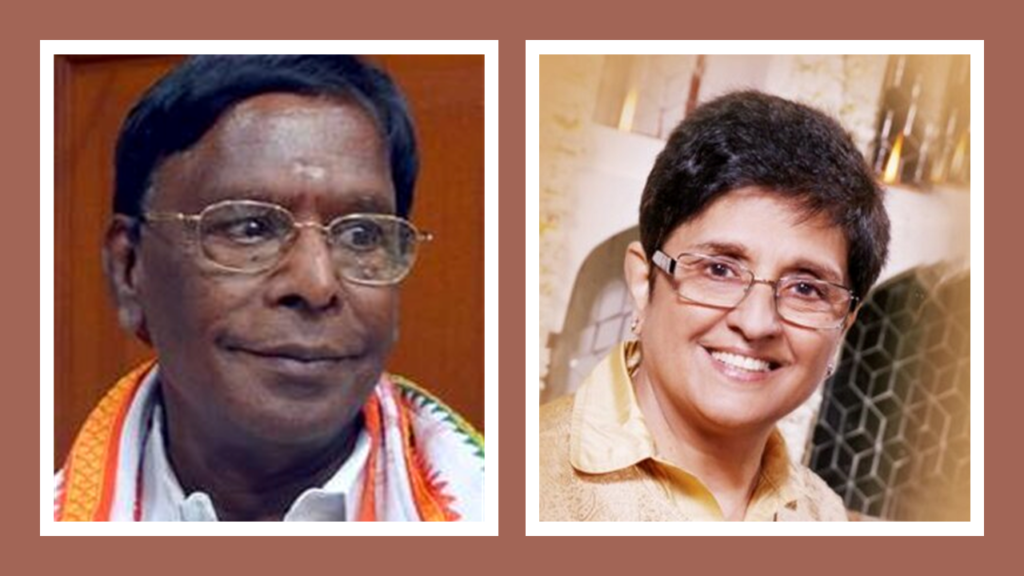Puducherry’s ruling party the Indian National Congress and some other local outfits will take to the streets on Saturday, in what is the latest round of the ongoing tussle between chief minister V Narayansamy and lieutenant governor Kiran Bedi. On the fourth of July, the lieutenant governor swore in three nominated MLAs in a ceremony conducted in her chamber, leaving the ruling party red-faced and infuriated.
Ever since, senior Congress party leaders and spokespersons have given soundbites to certain media outlets, propelling the issue into national limelight. According to them, the lieutenant governor has violated established rules and conventions. They have proclaimed Ms. Kiran Bedi to be an agent of the BJP, and stated that such a backdoor entry within a democratic framework is a typical BJP move. What has irked them farther is that two of the nominated MLAs are local BJP leaders, and the third is a well-known BJP sympathizer.
Leaving the political rhetoric and implications aside, let us examine the facts. Perhaps, if we are to delve into history and differentiate between law and precedence, a clearer picture might emerge. Puducherry and Delhi are the only two union territories in India to have an elected assembly and a local government. These governments have relatively fewer powers in comparison to state governments. The lieutenant governor of the union territory, a representative of the central government, is the effective administrator.
The Government of Union Territories Act 1963 states: “The Central Government may nominate not more than three persons, not being persons in the service of Government, to be members of the legislative assembly.” The nominated members cannot vote in the assembly. As to why such a provision allowing the central government to nominate three MLAs to the assembly came about in the first place, is anybody’s guess.
But irrespective of the what powers the nominated members enjoy and what the purpose of the provision in question might be, two clear implications emerge from the act I have quoted. The first is that the appointment of nominated members to the assembly is the central government’s prerogative. The second is that the appointment of three nominated members isn’t an obligation, but a course of action that the central government may choose to follow for whatever reason.
In the past, nominated MLAs have been appointed six times. In most instances, since the Congress Party ruled both at the center and at locally, the local governments were consulted by the center. The consultation process was initiated by the lieutenant governor, the center’s representative in the union territory. In fact, most often the local government came forward with names without the center indicating its interest to nominate legislators, and simply sought approval from the central government. In time, due to the political circumstance of having the same ruling party in the center and at the local level, the appointment of nominated members virtually became the local government’s domain.
It is in this backdrop that Puducherry’s ruling party, the Indian National Congress, is outraged after Kiran Bedi swore in three nominated legislators.
Chief minister Narayansamy is right when he claims that the move violates convention, but wrong when he claims that the move violates rules. Conventions have no standing in a court of law. And up until now, despite Ms. Kiran Bedi publicly asking the government to point out the rules she has allegedly flouted, the government has failed to answer the question.
Among the arguments presented by Ms. Kiran Bedi and her supporters is that the government was elected more than a year back, but failed to come up with names that the center could consider and eventually nominate to the assembly. That Ms. Kiran Bedi didn’t humiliate the government by dumping precedence in the dustbin right at the beginning and chose instead to wait for one whole year, must be appreciated by the local government. Technically, she requires no consent whatsoever from the local government to do what she did. Essentially, an unwritten privilege that the local government refused to use, was withdrawn.
Displeasure has been expressed over two other issues regarding Ms. Kiran Bedi ’s actions. The first is that she took the initiative to swear in the MLAs herself. The fact of the matter is that the speaker of the assembly deferred their swearing-in on a pretext that she didn’t believe was valid, and that being the administrator of the union territory, she is well within her rights to swear them in. In 1990 as well, the nominated MLAs were sworn in by the lieutenant governor as opposed to the speaker. The other is the political nature of the nominated MLAs. Nominated MLAs have always been affiliated with some political party or the other. No rule prevents the central government from appointing politically affiliated people as nominated MLAs. As nominated MLAs, they stop belonging to any party per say.
One of the Congress Party legislators has filed a Public Interest Litigation in the Madras High Court, against Ms. Kiran Bedi ’s move. It is unlikely to be upheld according to my understanding of the situation. The Congress Party’s stance seems to contradict the law, and seems hypocritical considering they have indulged in similar practices in the past. The bandh called on Saturday is likely to disrupt people’s lives, and the fact that it stems from a bruised ego, is unacceptable.
